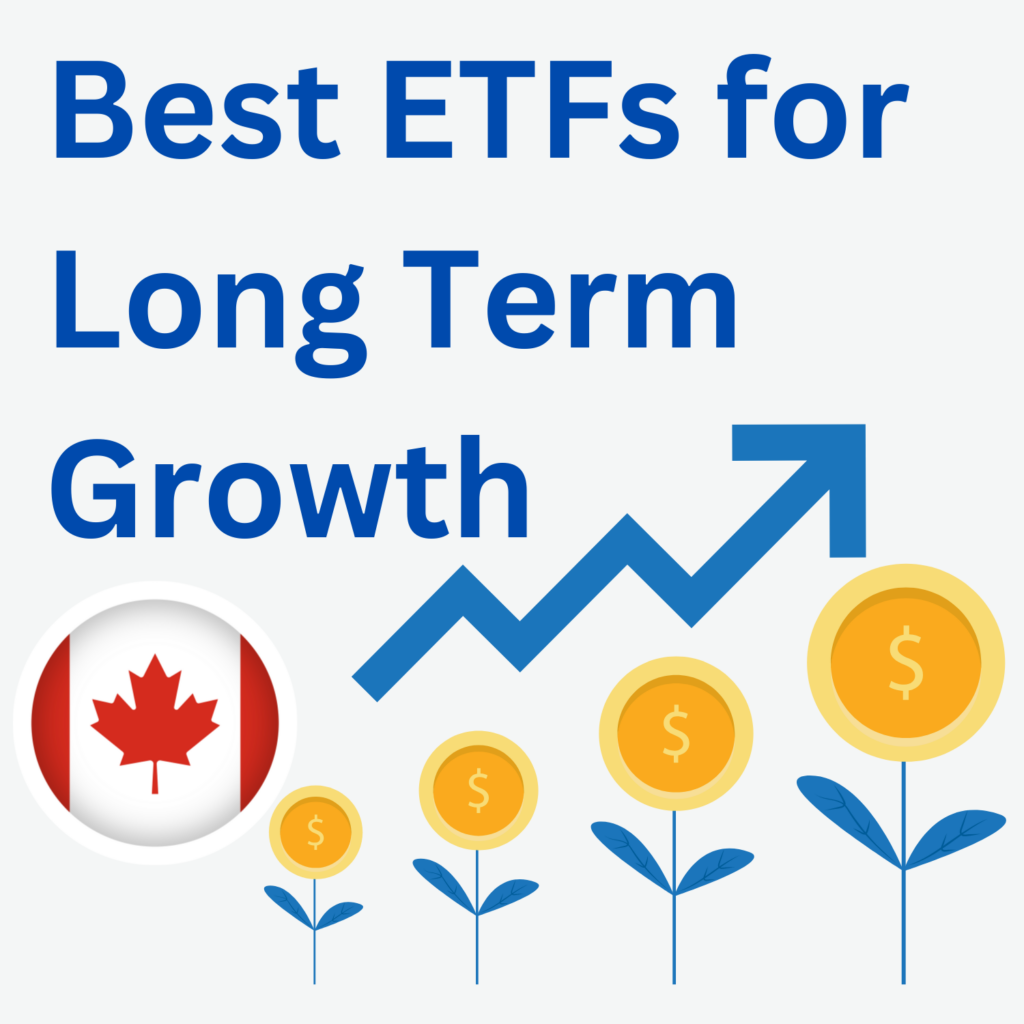In the world of investing, the pursuit of long-term growth is a common objective for many individuals. Whether you’re a seasoned investor or just starting to build your investment portfolio, identifying the right vehicles to achieve sustainable growth is crucial. Exchange-Traded Funds (ETFs) have emerged as popular investment options due to their diversification, cost-effectiveness, and ease of access. With an ever-expanding range of ETFs available, it can be overwhelming to choose the Best ETF for Long Term Growth.
In this post, we will dive into the realm of ETFs and explore some of the best options specifically tailored for long-term growth. We will examine various factors such as historical performance, underlying assets, expense ratios, and overall investment strategies. By the end of this guide, you will gain valuable insights into the top-performing ETFs that have the potential to deliver sustained growth over an extended period.
Best Canadian Dividend ETFs
Pros of Owning a Canadian Dividend ETF
Income Generation: Canadian Dividend ETFs invest in Canadian companies that pay dividends, providing a regular stream of income for investors. This can be especially appealing for investors who are retired or seeking income from their investments.
Diversification: Canadian Dividend ETFs invest in a broad range of companies, which can help investors diversify their portfolio. By spreading their investments across different sectors and companies, investors can reduce the risk of having all their eggs in one basket.
Lower Costs: ETFs typically have lower fees than actively managed mutual funds, making them an affordable option for investors who want to keep costs low.
Tax Efficiency: Canadian Dividend ETFs can be tax-efficient, as Canadian dividends are eligible for the dividend tax credit, which can reduce the amount of tax paid on the dividend income.
Top Canadian Dividend ETFs
Best ETF for Long Term Growth (Canadian Dividend)
Best US Dividend ETFs
Pros of Owning a Canadian Dividend ETF
Income Generation: Canadian Dividend ETFs that invest in US stocks can provide a regular stream of income for investors from US-based companies.
Diversification: Investing in a Canadian Dividend ETF that includes US stocks can help investors diversify their portfolio beyond Canadian companies and reduce overall risk.
Exposure to US Market: A Canadian Dividend ETF that invests in US stocks provides exposure to the US market, which is the largest and most diverse stock market in the world. This can provide investors with access to some of the largest and most successful companies in the world.
Top US Dividend ETFs in Canada
Best US Dividend ETFs in Canada (2023)!

Best Growth ETFs (Canadian Index)
Pros of Owning a Canadian Index ETF:
Diversification: Canadian Index ETFs invest in a broad range of companies across multiple sectors, which can help investors diversify their portfolio and reduce overall risk.
Low Fees: Canadian Index ETFs typically have lower fees compared to actively managed mutual funds, which can increase overall returns for investors.
Passive Investing: Index ETFs track a specific index, such as the S&P/TSX Composite Index, and do not require active management, which can be less time-consuming for investors.
Market Exposure: A Canadian Index ETF provides exposure to the Canadian market, which can help investors capture the overall performance of the Canadian economy.
Top Canadian Index ETFs (Growth)
Best ETFs in Canada 2023 (Canadian Index)
Best Growth ETFs (US index: S&P 500)
Pros of Owning an S&P 500 Index ETF
Exposure to US Market: The S&P 500 Index ETF provides exposure to the US market, which is the largest and most diverse stock market in the world. This can provide investors with access to some of the largest and most successful companies in the world.
Diversification: Investing in an S&P 500 Index ETF can help investors diversify their portfolio beyond Canadian companies and reduce overall risk.
Low Fees: S&P 500 Index ETFs typically have lower fees compared to actively managed mutual funds, which can increase overall returns for investors.
Passive Investing: Index ETFs track a specific index, such as the S&P 500 Index, and do not require active management, which can be less time-consuming for investors.
Top Index ETFs (US S&P500 Index)
Top All In One ETFs (Growth)
Pros of Owning an All-in-One ETF:
Simplified Investing: An all-in-one ETF provides investors with a single investment that contains a diversified portfolio of stocks and bonds, which can simplify the investing process and save time.
Diversification: All-in-one ETFs invest in a broad range of companies across multiple sectors and geographic regions, which can help investors diversify their portfolio and reduce overall risk.
Low Fees: All-in-one ETFs typically have lower fees compared to actively managed mutual funds, which can increase overall returns for investors.
Passive Investing: All-in-one ETFs track a specific index and do not require active management, which can be less time-consuming for investors.
Top All In One ETFs
Best All-In-One ETF Canada 2023
- CIBC Investor’s Edge Review (2023)
- Review of VDY – Vanguard FTSE Canadian High Dividend Yield Index
- Best Canadian monthly dividend ETF – 2023
Currency risk coverage (Hedged vs Unhedged)
When the manager has to replicate a U.S. index such as the S.P. 500 or the Nasdaq 100. It must acquire these assets in U.S. dollars. So, on a fairly regular basis, the fund has to convert the funds available in Canadian dollars into U.S. dollars. These conversions may be beneficial or have a negative impact depending if the Canadian dollar has appreciated or depreciated.
Many investors want to reduce this risk. To meet their needs, the majority of ETFs that reproduce a U.S. index offer a “hedged” version of their funds and sometimes another version that is traded only in U.S. dollars. Coverage acts as a kind of insurance. See the scenarios presented below:
| Scenario 1: Value of Canadian $ appreciated | Scenario 2: Value of Canadian $ depreciated | |
| Non hedged ETF | Index return Minus foreign exchange loss | Index return Plus foreign exchange gains |
| Hedged ETF | Index return | Index return |
| US $ ETF | Index Return The investor chooses when to convert | Index Return The investor chooses when to convert |
Disclaimer
The data on this website is for your information only. It does not constitute investment advice, or advice on tax or legal matters. Any information provided on this website does not constitute investment advice or investment recommendation nor does it constitute an offer to buy or sell or a solicitation of an offer to buy or sell shares or units in any of the investment funds or other financial instruments described on this website. Should you have any doubts about the meaning of the information provided herein, please contact your financial advisor or any other independent professional ad

